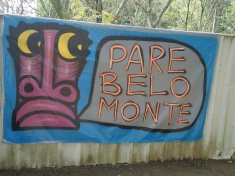Belo Monte Operating License Suspended

The rule of law in Brazil is not a lost cause.
Despite overarching trends to the contrary, we saw signs of hope last week when two positive legal decisions came down in Brazil regarding the disastrous Belo Monte mega-dam project.
In the first, a Brazilian judge suspended Belo Monte’s operating license because the consortium that holds the concession, Norte Energia, failed to provide water and sanitation services to the city of Altamira.
This legal decision should have come long ago. Norte Energia was supposed to install water and sanitation services in Altamira, the city most affected by Belo Monte, at the beginning of the project, and didn’t. Without a functioning sanitation system in Altamira, Belo Monte’s reservoir is in danger of becoming stagnant pool of sewage – which would have major negative health impacts in the region.
Contractually, Norte Energia was supposed to install sanitation infrastructure in Altamira and leave it in working condition. But the company reneged on its promise to connect houses to the sanitation system so that they could cut costs to maximize profits. They were ordered to do it, and didn’t.
A working sanitation system is not too much to ask for – access to water and sanitation are basic human needs which have increased greatly as a result of the project’s adverse impacts. Norte Energia never should have received the operating license to begin with, for this and other reasons.
The judge’s decison means that Norte Energia has to finally live up to its promises, at least on basic sanitation. This ruling can’t reverse the enormous damage of Belo Monte, but at least they’re being held somewhat accountable.
In the second sign of hope, an appeals court just ruled favorably on a lawsuit filed back in 2007 by federal public prosecutors. This lawsuit questioned the promiscuous relationship between Eletrobras, the giant state energy company, and three of Brazil’s largest construction companies: Andrade Gutierrez, Odebrecht and Camargo Correa.
During the planning stage of Belo Monte, the environmental impact assessment was awarded to these companies without a competitive bidding process. This may seem like a small thing, but it wasn’t: The private companies that would likely be building the dam were contracted to produce the principal study that the federal environmental agency, IBAMA, would use to decide whether or not the project should move forward.
There’s a clear conflict of interest here: The companies had a major financial incentive to sweep social and environmental impacts under the rug and recommend that the project go forward. There were huge profits to be made, and these companies were not going to leave this money on the table.
EIAs are supposed to be unbiased, and the state and private companies that conduct them must be able to accept the conclusion

that a project isn’t viable – socially, environmentally and economically. Not surprisingly, private companies in search of highly lucrative contracts are extremely unlikely to reach such a conclusion, especially when they can count on Eletrobras and the central government to smooth the project's path, something that has become a modus operandi of the Brazilian dam industry.
The decision handed down by the appeals court confirms that the contract for the Belo Monte environmental assessment was illegal, given a clear conflict of interest in the relationship between Eletrobras and private construction companies. The companies were ordered return to public coffers the money they received from Eletrobras. They are expected to appeal the case with the Supreme Court.
These victories may seem small, especially given that untold damage has already been done to the Xingu River and local populations, whose rights have been systematically violated. But they are small signs that the rule of law is beginning to reassert itself in Brazil – particularly with the cancellation of the São Luiz do Tapajós Dam – and this could have implications for future dam and infrastructure projects with high potential for corruption and disastrous social and environmental impacts.
In Belo Monte, the private construction giants Andrade Gutierrez, Odebrecht, Camargo Correa, OAS and Queiroz Galvão all became part of a private construction consortium known as CCBM, that assumes essentially no financial risks – i.e. they get paid regardless of how the project turns out. Brazilian taxpayers and state pension funds pay the price: They have taken on the main financial risks of Belo Monte.
As the Lava Jato investigations into Brazil's mind-boggling corruption schemes unfold, evidence of massive corruption in Belo Monte has grabbed the headlines. On September 6, news broke that four elite senators of PMDB, the ruling party of Michel Temer – who has replaced Dilma Rousseff as president after she was ousted last week in impeachment proceedings – successfully pocketed $50 million from Belo Monte construction contracts between 2010 and 2014. This happened at a time when the PMDB was considered part of Rousseff’s ruling coalition; it controlled the Ministry of Mines and Energy, with the notorious figure of Edison Lobão as Minister. The PMDB’s ill-gotten gains from Belo Monte is reportedly double what the construction companies contributed, from Belo Monte proceeds, to Dilma’s 2014 reelection campaign.
The more we know about Belo Monte, the clearer it is that corruption was the main driver of this project. The greed of a handful of politicians and corporate heads has subverted democratic institutions and the rule of law, destroying precious and irreplaceable ecosystems and violating the rights of indigenous peoples and other local groups in the process. If the Brazilian judiciary system can stand its ground, under pressure from Public Prosecutors and a vigilant civil society, we could see a more equitable and fact-based decision-making in the future.




